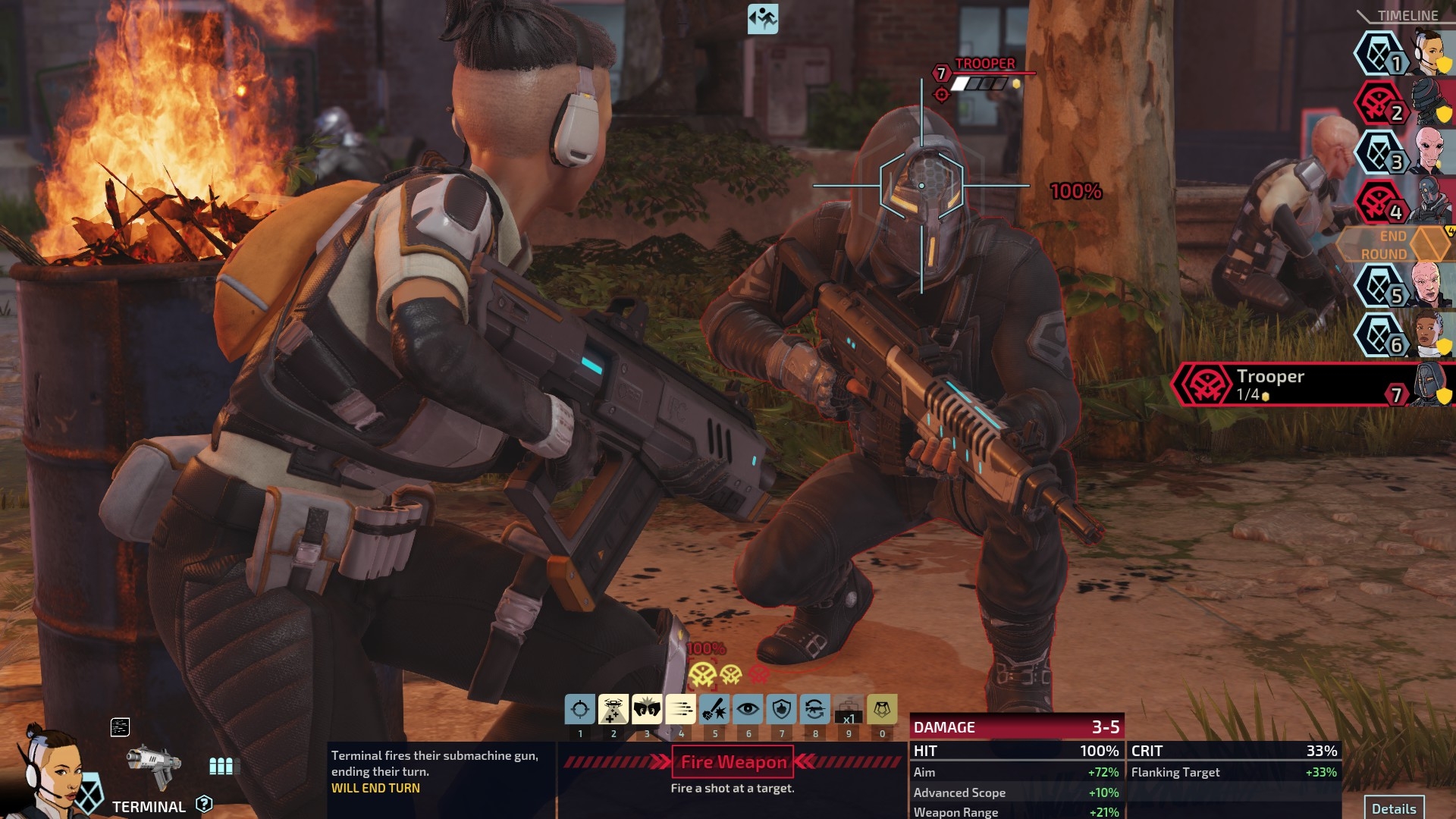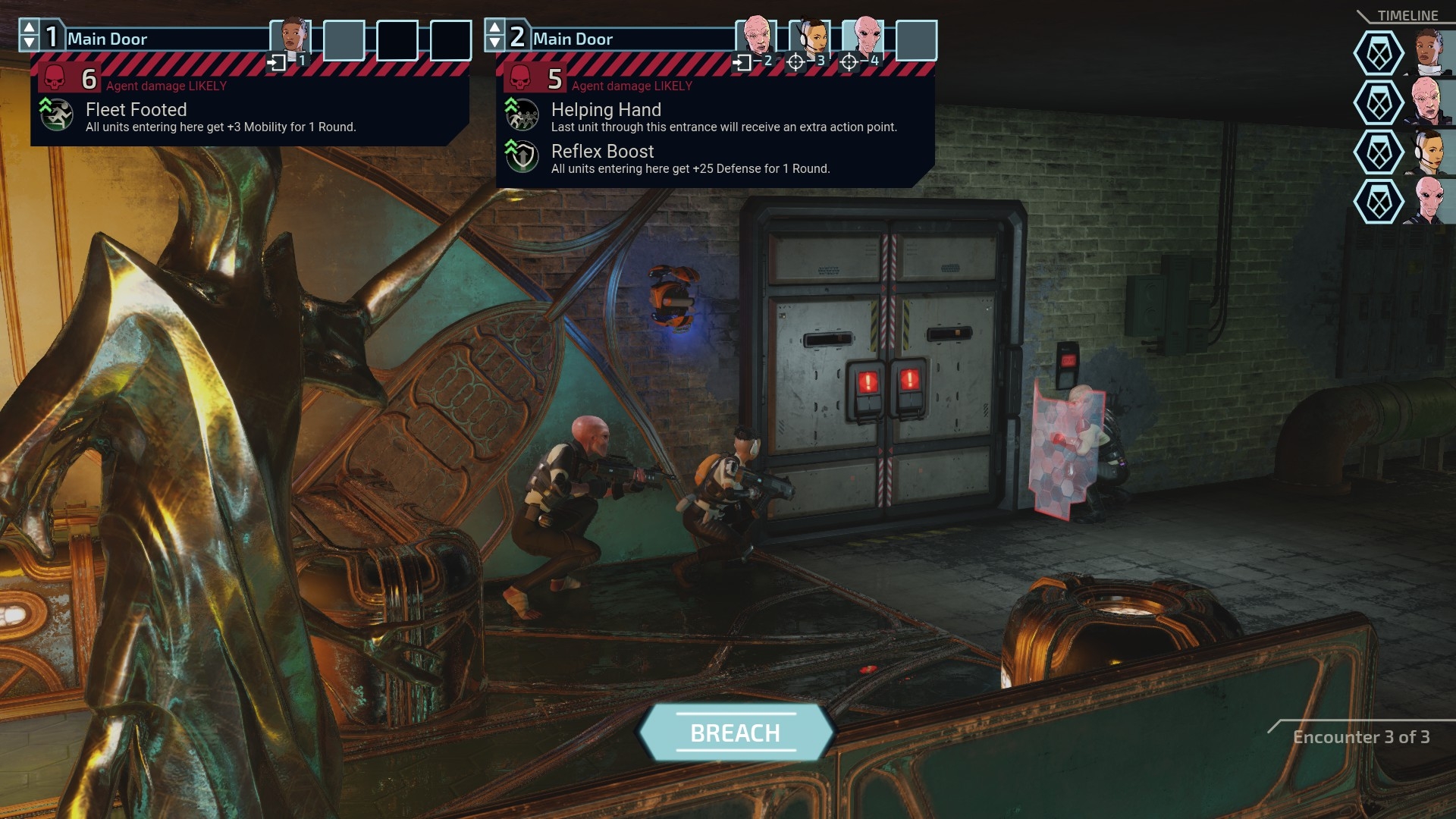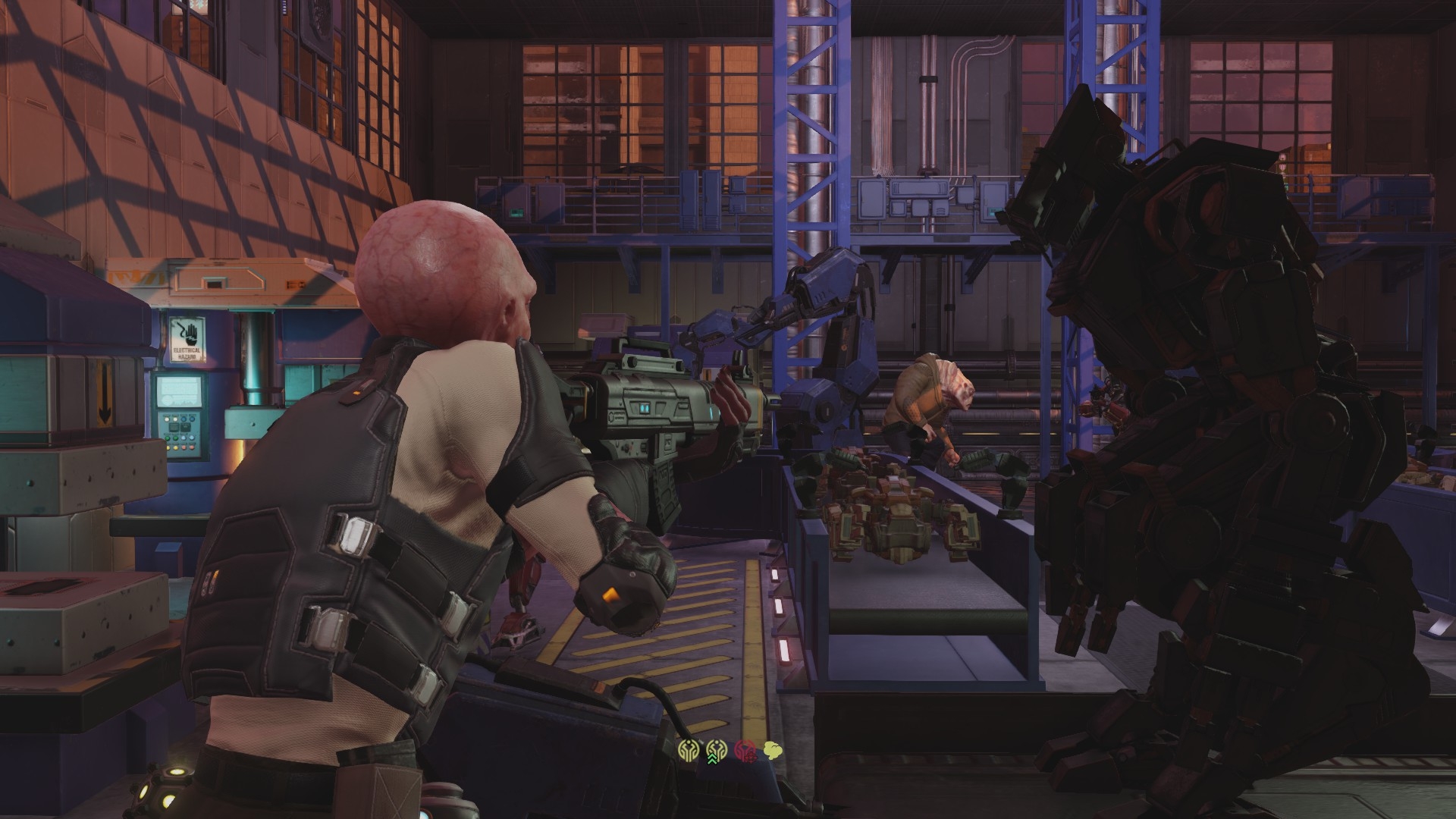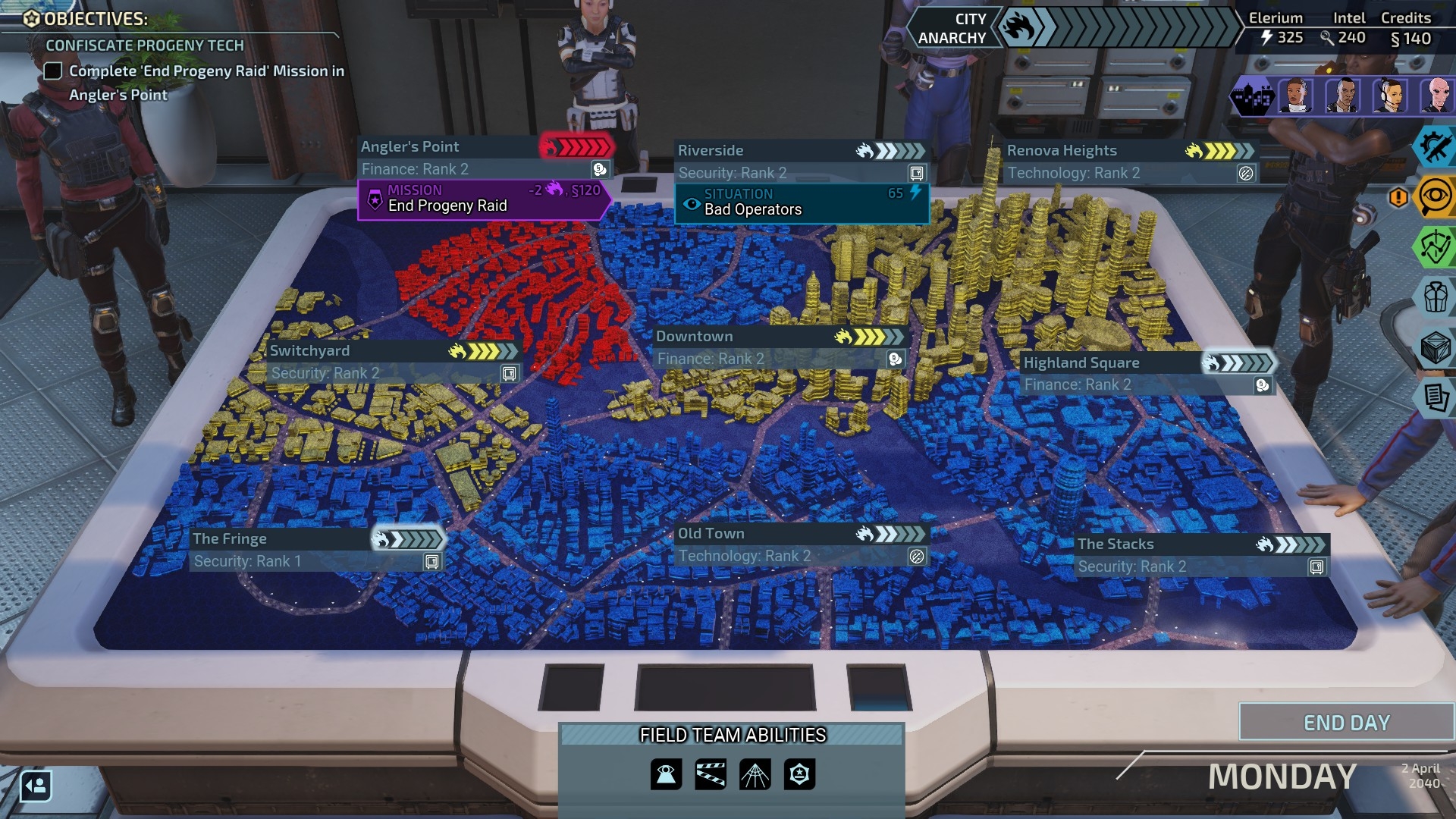Our Verdict
A fine superhero SWAT team tactics game smothered by a little too much admin.
PC Gamer's got your back
What is it? A city-scale turn-based tactics game about squashing resistance outfits before they reduce the city to anarchy.
Expect to pay $20/£17
Developer Firaxis
Publisher 2K
Reviewed on Intel i5-4670K CPU, GTX 970, 8GB RAM
Multiplayer No
Link Official site
My squad hangs precariously from rappel lines at the windows of a warehouse. A resistance group has been conducting troubling experiments on the premises, and it's time to shut them down.
Each breach point has pros and cons. I assign my human-alien hybrid Cherub to the most dangerous entrance. His massive shield should protect him from return fire. I assign my shotgun-wielding badass Godmother to a breach point that grants extra mobility, which should help her get close to the enemy. I assign my medic to the safest entrance, and my psychic alien warrior Verge to the last one. A big inviting button invites me to 'BREACH'. Time to take a deep breath and see what happens.
XCOM: Chimera Squad is still classic XCOM. You gather resources and unlock technology on the strategic map, and then dive into turn-based tactical battles to secure objectives and beat down the resistance menace. The world has changed, though. The Advent war is over. Humans, aliens, and hybrids have reached an uneasy peace. In City 31 they live side by side, but there are still restless groups who want to continue the grudges of the Advent war. Chimera Squad is a special forces unit designed to cripple those resistance movements and keep the peace.
There's no world map here. The game focuses purely on City 31's nine districts. You have to manage levels of unrest in each district to keep the city's anarchy level low. If the city anarchy bar maxes out, it's game over. To save the city you need to investigate three resistance groups, one at a time. You take on missions, gather intel, research new gear, unmask each group's leader, and then take them out in climactic final missions. Don't be fooled by the smaller scale; this is still a lengthy, chunky tactics game.
Missions are much shorter than XCOM fans will be familiar with, however. Some are just a few rooms packed with enemies. Significant missions are chains of three room-clears, each of which has a 'breach' phase in which you position your squad at different entrance points. That's why my squad members are dangling off ropes outside an old warehouse.
The breach phase is chaotic. One by one my four squaddies smash through their assigned window. Then time slows to a crawl. The camera shifts to an over-the-shoulder perspective as my primary breacher, Cherub, takes aim. The camera has a blurry fish-eye filter that makes it impossible to gauge the layout of the room, but I can switch focus between enemies and choose what I want to pick off. I tab between enemies, noting their classes. There's a turret—that will deal reliable damage to my squad over time, but it can wait. There are a couple of androids, easily killed but they can self-destruct and do significant area-of-effect damage.
Then I see a purifier. The purifier has to die. It's just a man with a flamethrower, but area-of-effect attacks are massive when you're fighting at room scale. The flames can linger and make traversal a nightmare. Also the initial spray can set off explosive barrels, creating a cascade of events that could end up with my entire squad aflame and covered in acid.
Keep up to date with the most important stories and the best deals, as picked by the PC Gamer team.
Instead of shooting, I order Cherub to hunker down. You don't create your own characters in Chimera Squad. Each of the 11 available heroes have unique abilities. Each functions as a separate class. You'll recognise some archetypes from XCOM 2—the gunslinger, the medic with a healing drone, the shotgun maniac. Then there are others like the muton Axiom, who hits people and sometimes goes berserk in the middle of a mission.
This approach sacrifices one of XCOM's greatest features: the ability to name your soldiers and bond with them over the course of a campaign. There are advantages though. Each character is voiced. The story is told through cartoon vignettes that efficiently lay out the stakes and do a good job of describing the new world order with humour and character—one off the cuff description explains that City 31's inhabitants fry and eat the terrifying Chryssalids as though they're lobsters. There's tension too. Some of the hybrids on your team may have fought on the alien side in the Advent war against the humans. The events of XCOM 2 loom over City 31 throughout.
Cherub's hunker down ability is amazing. He draws all enemy fire and takes it harmlessly on his shield, sparing his teammates from the threat of return fire. Next up is my most powerful guy, the psionic Verge. Instead of shooting he uses his mind to lift the purifier out of cover. Suspended in midair, he's an easy target for my other two teammates, who execute him before the battle even starts.
Your soldiers can't die in XCOM: Chimera. If you evac and leave them bleeding out on the tarmac they register as 'gravely wounded' at the end of a mission.
Wounds don't take soldiers out of action, instead there's a chance that they will give that agent a 'scar', which amounts to a stat reduction that you can burn off by sending that agent on a healing training routine for a few turns.
Watch out though, some missions auto fail if you let an agent bleed out. As long as you stabalise them, you're fine.
I found the breach phase irritating at first. I'm used to having a lot more battlefield awareness in XCOM, but Chimera Squad deliberately sends you in blind. It's a very different dynamic to XCOM 2. That game is about advancing efficiently and positioning properly across large maps. You manage odds and control the situation as much as possible. Chimera Squad throws a scenario at you and shouts "catch!".
The breach phase is about eliminating important enemies. Once that's over your squad automatically moves to cover and a traditional XCOM fight ensues. They take cover intelligently, most of the time, but it's another point where the game takes tactical choice away from you. Once I learned to shrug and go with the flow of the game I started to like it a lot more, but you're always a victim of circumstance in Chimera Squad.
Things picked up when my heroes started to level up and their unique talents came online. There are some delicious combos to unlock. My medic has an incredible ability to give a teammate a free action. This is fantastic paired with Verge, who can draw enemies into a psychic web, one by one, and then zap them all with his brain for guaranteed damage. In XCOM's world of percentage chances, that sort of en masse two-to-three points of chip damage is gold. Beautifully, he can brain-zap everyone, and then the medic can throw him a free action so he can brain-zap everyone again. These are XCOM Chimera's best moments, when you engineer team combos and wipe out a whole room in just a few turns.
I like the heroes a lot, but there's not much experimentation space in XCOM, especially when fights are just a few rooms long. I wish the heroes had some of those powerful unique skills unlocked already so I could switch them around and play with combos right away. The game removes XCOM 2's health pool race at least, which demanded that you level up armour and weapons to keep up with enemies' ever expanding health bars. That's great in XCOM 2, but keeping health pools and damage output stable leaves you free to swap in inexperienced heroes without too much loss of power.
The game runs well on high and maximum settings for me on a GTX 970, with a few exceptions. There are certain points when the game stutters, notably sometimes when it's seemingly resolving damage outcomes. Breaching moments also involve a quick freeze when the actual breach happens and your agents storm in. The game is still perfectly playable, but it's a regular annoyance.
The strategy layer of the game is surprisingly involved too. There's no base building, but you still need to research technology, buy gadgets, and gather three resources: elerium, intel, and dollars. I miss the cool visual armour and weapon upgrades of traditional XCOM. Without them the strategy layer feels like fussy, abstract number crunching. You can (and really should) deploy field teams to the city's districts. These function a bit like XCOM's satellites. They keep unrest down and feed you resources so you can buy rad flashbangs for your squad. Separately, you can deploy squad members to work on spec ops, which sounds exciting, but it's just another way to hoover up resources. Without base building and XCOM 2's lavish presentation, it all feels too much like admin.
It's still an involving tactics game though. It's a curious XCOM experiment with a neat setting that I'd like to explore more. It's fantastic value, too. This isn't budget XCOM exactly, it's an attempt to rework the series' rules into a snappier experience. There's a version of Chimera Squad I can imagine that's even more elegant and streamlined, but I still felt the familiar feelings of elation when a combo comes off, and annoyance when that 90 percent shot misses. If anything, it's convinced me to start yet another XCOM 2 campaign, and that's no bad thing.
A fine superhero SWAT team tactics game smothered by a little too much admin.
Part of the UK team, Tom was with PC Gamer at the very beginning of the website's launch—first as a news writer, and then as online editor until his departure in 2020. His specialties are strategy games, action RPGs, hack ‘n slash games, digital card games… basically anything that he can fit on a hard drive. His final boss form is Deckard Cain.






